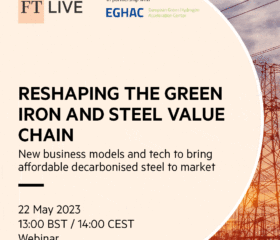
A Nordic hydrogen industry for Europe and beyond
The H2 Value Chain 2021 event took place online on 18 March 2021. Now in its second year, the event explored how to drive innovation and accelerate growth across the hydrogen value chain in the Nordic countries. A full recording of the event can be found here.
If 2020 was a breakthrough year for hydrogen, 2021 is the year that the hydrogen industry is expected to burst open. The abundant opportunities in a new hydrogen-oriented economy and the momentum behind it were on full display during the H2 Value Chain 2021 event last week. With its long tradition in leading the energy transition, the Nordics are motivated and well-positioned to serve the hydrogen industry. The event explored not only this but also how the Nordic region could become a leading player in Europe and on the global scene.
H2 Value Chain brought together industry players, investors, public organisations and start-ups from the region to reflect on the role of its industry in the future hydrogen economy while showcasing inspiring industrial projects and initiatives across the value chain. The development of green hydrogen also featured prominently at the event, not least of all for the important role it has to play in the energy transition.
“There is no doubt that hydrogen plays a key role in the ongoing energy transformation. And there is an ongoing global race between countries, regions and industries to claim their position in the future hydrogen economy.” This was the sentiment with which Knut Linnerud, Cluster Manager of H2Cluster opened the event, setting the stage for the Nordic context and before handing over to Tejs Laustsen Jensen, Chairman of the Nordic Hydrogen Partnership (NHP) and CEO of Hydrogen Denmark. Jensen was quoted as describing hydrogen as “the Swiss army knife of green energy. Because it has so many functions and applications and can conform to many parts and sectors of our society,” which was clearly demonstrated throughout the event.
A Nordic industry to serve a global market
The mandate to cooperate on hydrogen within the Nordics is in large part due to the massive opportunity in the region and very strong linkage with different parts of the value chain. This includes the renewable capability from the North Sea through offshore wind, the steel industry in Sweden, energy production in Iceland, underground storage opportunities in Denmark and tradition of hydrogen in Norway.
The ambition of the presenters and speakers that joined this exciting debate, is to establish the Nordics as a first-mover region and contribute to the value chain in green energy in the form of hydrogen, in turn establishing Europe as a strong player on the global scene. Developments that are currently happening at a Nordic-level will support a coordinated European effort to become a leader in hydrogen, for example enabling other European countries to purchase green hydrogen from within the EU, rather than non-green hydrogen on the international market.
A much-anticipated strategic positioning report of the Norwegian hydrogen industry titled “Hydrogen: Great opportunities, action needed” (in Norwegian) was launched during the event. The findings of which were presented by Jan Glendrange of Zynk Communication & Leadership and followed by a panel debate with several of the twenty stakeholders that were interviewed for the report. Key findings are applicable not just to the Norwegian hydrogen industry, but also show lessons for the Nordic region as a whole – outlining the opportunities but also the necessary steps to take to break down current barriers. It stresses, among other things, how industrialisation and scale should be the focal points. Policies and instruments must stimulate the business community to take the risk that full-scale investments in hydrogen production entail, while clear goals and targets should be set. As Glendrange stated “Hydrogen is poised to become a global green mega industry, with large countries already investing aggressively.” This is not just a game for large private investors and energy companies, but also for the nation states. Norway and neighbouring countries have to be able to to think big enough and take enough risks.
Think big, think value chain
“We must think value chain”, commented Thorsten Herbert from NEL in the first panel discussion. And we couldn’t agree more. Jacob Ruiter, CEO of EIT InnoEnergy Benelux explained how EIT InnoEnergy capitalised on its experience in creating industrial value chains such as the European Battery Alliance to launch the European Green Hydrogen Acceleration Center (EGHAC). The EGHAC focuses purely on accelerating the uptake of green hydrogen in Europe and wants to build a EUR 100 billion a year green hydrogen economy, creating up to 500,000 direct and indirect jobs across the complete value chain. The ambition for yearly demand for useful green hydrogen-based energy will be 1200TwH. It acts as an open platform, bringing interested parties together from across the value chain to forge the connections necessary to build a pipeline of industrial green hydrogen projects. “Green hydrogen can play a vital role in the energy transition because it enables sector coupling and can make a step-change in decarbonising various industries. Green hydrogen is not the goal but the means (to contribute to a sustainable energy future),” according to Jacob Ruiter.
Already in the Nordics there are front-running examples of hydrogen initiatives and these gamechangers took the virtual stage to discuss their large-scale projects. Maria Persson Gulda, Chief Technical Officer at H2 Green Steel in Sweden discussed the transition to fossil-free steel manufacturing at scale and their efforts to accelerate the market. H2 Green Steel’s business model is one that focuses on co-creation, involving the customer throughout the company development and also seeking synergies. Several investors in H2 Green Steel are also invested in Northvolt, enabling them to transfer their experience with the highly impactful Northvolt journey. Backed by EIT InnoEnergy and considered as the lighthouse project of the EGHAC, the H2 Green Steel initiative is poised to produce 5M tons of high-quality CO2-free steel by 2030 while mobilising EUR 2.5 billion in investments and creating 10,000 jobs as early as 2024.
Other gamechangers that presented their projects included Anders Nordstrøm of Ørsted who discussed the opportunities for Copenhagen as a global hub for sustainable fuels; HySHIP, a hydrogen ship demonstration project presented by Per Brinchmann from Wilhelmsen; and Magnus Krogh Ankarstrand from Yara who led a discussion on the value chains for green hydrogen and green ammonia. The experiences from these projects clearly showed that that early market opportunities exist and collaboration between industry, investors and innovators are a key success factor.
Opportunities for more entrepreneurship and innovation
The event closed with its final session focusing on the challenges and opportunities for start-ups as the hydrogen economy grows.
EIT InnoEnergy has already made for instance over 15 hydrogen-related investments in recent years into innovations at different stages of maturity. Some include Hymeth, Hysilabs, Atawey, Sylfen or Celcibus. The company is also involved in more than 20 large-scale renewable energy projects with massive output, contributing to the green hydrogen value chain.
Cleantech Scandinavia’s Managing Director Magnus Agerström reported on an overall growth trend of the Nordic hydrogen market, noting that “investments into hydrogen are gathering momentum and Europe leads globally.” Continuing, he said, “cost and risk were big barriers when presenting hydrogen to investors in the past but this has changed (due to) the urgency for finding clean energy, addressing the climate problem, and that cost has come down.”
And a next wave of Nordic hydrogen technology companies should soon be greatly bolstered in the market. The Nordic Hydrogen Launcher is a new accelerator programme for start-ups with international scale-up potential that focus on the hydrogen value chain. “It was created as a response to a consensus among investors and large industrial players that the hydrogen value chain will increase significantly in the years to come,” said Daniel Ras-Vidal, CEO of Kjeller Innovasjon. The launcher will help start-ups reach the market faster and overcome challenges by bringing established industrial players and newcomers alike together. Applications will open in May with a programme scheduled to start in September this year.
The H2 Value Chain 2021 event was co-organised by EIT InnoEnergy, H2 Cluster, Kjeller Innovasjon and the Norwegian Hydrogen Forum. The full recording of the event can be found here.




